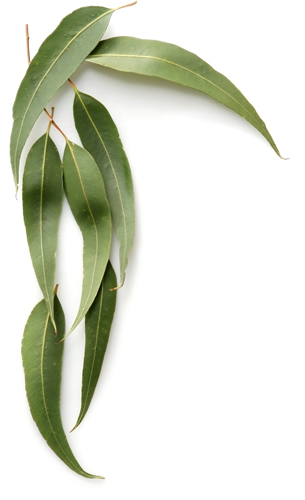Description
Botanical: Eucalyptus globulus
Other common names: Blue Gum, Eucalyptus, Fever Tree, Gum Tree, Australian Fever Tree, Tasmanian Blue Gum, Malee, Stringy Bark Tree
Eucalyptus Leaf is legendary for its ability to clear respiratory and nasal passages of congestion and mucus, thus relieving colds, sinusitis, influenza, croup, emphysema, chronic and acute bronchitis, asthma and dry coughs. It is also a superior antibacterial, antifungal, antiviral and antiseptic that improves skin problems and combats staph and strep infection, as well as an anti-inflammatory that relieves muscular pain and soothes painful arthritic joints when used as a topical analgesic.
(eucalyptrin, hyperin, hyperoside, quercetin, quercitrin and rutin); triterpenes (ursolic acid derivatives); monoterpenes (alpha- and beta-pinene, D-limonene and P-cymene); sesquiterpenes; aldehydes (myrtenal) and ketones (carvone).
Country of Origin: United States
Beneficial Uses:
Eucalyptus is widely used as an effective decongestant and expectorant (whether ingested, inhaled or rubbed topically on the skin), and these properties dilate the bronchial tubes and help to loosen and expel phlegm and congestion from the respiratory system and nasal passages. The oil is an expectorant component of many decongestant compounds, cough syrups, cough drops and lozenges and is said to relieve excess mucus, colds, influenza, croup, pulmonary tuberculosis, emphysema, chronic and acute bronchitis, asthma and dry coughs. Lozenges containing eucalyptol increase saliva production, prompting more frequent swallowing and thus reducing the impulse to cough. The oil's antibacterial actions may also reduce the risk of a secondary respiratory infection. In Germany, Eucalyptus Leaf is licensed as a standard medicinal tea for bronchitis and inflammation of the throat.
Further supporting Eucalyptus as a decongestant, the volatile oil, eucalyptol, is said to function (like menthol) by acting on receptors in the nasal mucosa, reducing nasal congestion, which is very helpful in cases of sinusitis. When used as an inhalant, Eucalyptus also works as an expectorant, loosening sticky mucus and making it easier to cough up and out of the chest and nasal passages, which also helps to relieve colds, flu, croup, emphysema, pneumonia, chronic and acute bronchitis, asthma and dry coughs. When inhaled, Eucalyptus prompts the Eustachian tubes connecting the middle ear and the throat to open, and when fluids drain from the ear as a result, earache pain and pressure is often relieved.
In addition, astringent substances in the oil called tannins tighten and thus soothe mucous membrane inflammation in the mouth, nose and throat. When used topically in vapor rubs, the oil (diluted with a carrier oil, since it is very strong) may be rubbed directly on the chest, back or throat to relieve congestion or pain.
Eucalyptus is famous for its antiseptic, antibiotic, antiviral and germicidal properties, and it is thought to be the most powerful disinfectant in its class. The oil and resin's antibacterial qualities are so strong that it has been used for sterilizing medical and surgical equipment and was even briefly referred to as "catheter oil." Eucalyptus is effective against many bacterial organisms, especially Staphylococcus, as well as malaria, Bacillus subtilis and several strains of Streptococcus.
As an aromatic stimulant, Eucalyptus is believed to treat weak stomachs and nausea.
As an antiviral, Eucalyptus oil is said to exhibit anti-infectious activity against herpes simplex virus. Although the active anti-herpes components are not yet known, the virucidal activity was particularly effective when combined with tea tree oil, and laboratory experiments show great promise in reducing virus titers (from ticks) and viruses associated with Chronic Fatigue Syndrome and West Nile virus.
Eucalyptus is considered an anti-inflammatory and topical pain reliever that helps to soothe aching joints and painful arthritis. Rubbed into the skin, it stimulates blood flow and generates a feeling of warmth that reduces pain and eases muscular pains.
For further use of Eucalyptus externally, its exceptional antiseptic qualities help to fight infection-causing bacteria, fungi and viruses and work to heal skin lesions, chapped skin, cuts, scrapes, wounds (particularly when infected), abscesses and carbuncles. Its antibacterial and deodorant properties make it effective in treating decaying, discharging wounds, ulcers and gangrenous or cancerous lesions. It is also used to combat dandruff, and bacterial plaque formation on teeth (when chewed as Eucalyptus gum).
Contraindications:
Excess use (many times the recommended dosage) of Eucalyptus Herbal Supplement may cause headaches, nausea, vomiting, diarrhea and inflammation of the gastrointestinal tract and bile ducts. The effects of other prescription or over-the counter drugs may be weakened and/or shortened when using this herb, and a healthcare provider should be consulted before taking 5-Fluorouracil, phentobarbital or amphetamine, as there may be interactions. If you are taking any prescription medication for a health condition, speak with your doctor before taking this herb. Excess usage by people with low blood pressure should be avoided, as it may cause a further drop in pressure.
Do not mix Eucalyptus with alcohol. Use of Eucalyptus oil requires caution when used topically, as it is very strong, and mustalways be diluted with a "carrier" oil (sunflower, etc.). Eucalyptus preparations should not be applied to the face, especially the nose, of babies and children. Before taking Eucalyptus Leaf, tell your doctor if you have liver disease or an inflamed (swollen and sore) stomach or intestinal tract.


